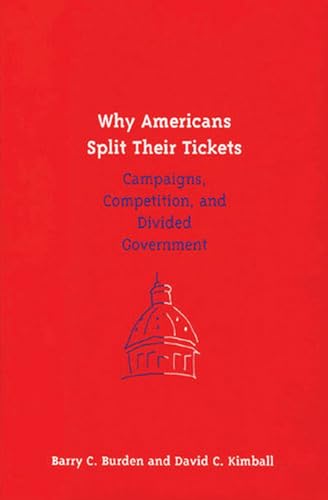Why Americans Split Their Tickets: Campaigns, Competition, and Divided Government - Hardcover

Burden and Kimball draw upon a diverse and unique range of data as evidence for their argument. Their analyses rely on survey data, aggregate election returns, and new ecological inference estimates for every House and Senate election from 1952 to 1996. This approach allows for the examination of divided voting in traditional ways, such as choosing a Democratic presidential candidate and a Republican House candidate on a single ballot, to less traditional forms, such as voting in a midterm House election and choosing a state's Senate delegation.
Barry C. Burden is Assistant Professor of Government, Harvard University. David C. Kimball is Assistant Professor of Political Science, University of Missouri, St. Louis.
"synopsis" may belong to another edition of this title.
Barry C. Burden is Associate Professor of Government at Harvard University.
David C. Kimball is Assistant Professor of Political Science at the University of Missouri, St. Louis.
The government shutdowns, partisan bickering and brinkmanship, blame avoidance, and elected officials' failure to reach an agreement on an important national problem clearly did not sit well with American citizens. Public approval of Congress and its leaders sunch to new depths at te end of 1995. And while conventional wisdom may hold that the budget standoff enhanced Clinton's stature at the expense of the Republicans, the president's approval ratings also dipped during the budget dispute. One national survey taken in December 1995 found that a plurality believed that continued divided government would be worse than would be unified government under either party. When the president and Congress agreed to pass temporary continuing resolutions in January 1996 that would keep the government open through the November election, both sides proclaimed that the American electorate would have to decide which party better reflected the country's spending and revenue priorities. The implication was that the budget stalemenate would motivate votes to choose sides in the upcoming election.
Nevertheless, less than ten months later, American voters maintained the same pattern of divided government by reelecting President Clinton and returning Republican majorities to the House and Senate. Clinton won reelection by a larger margin than he had garnered in 1992 at the same time that the Republican Party gained two seats in the U.S. Senate. In fact, all of the major players in the budget talks of 1995-96 (with the exception of Bob Dole, who resigned from his Senate seat to run against Clinton) retained their positions after the November 1996 elections.
Why would voters choose the same divided government configuration again after it seemed to fail so miserably in the winter of 1995-96? Do voters prefer divided government and policy stalemate? No less than an authority than Bill Clinton has remarked that "a lot of the time in our history the American people would prefer having a president of one party and the Congress the other." The mainstream press offered similar explanations for the 1996 elections, concluding that the outcome was a mandate from the voters for bipartisanship and compromise in Washington.
"About this title" may belong to another edition of this title.
- PublisherUniversity of Michigan Press
- Publication date2002
- ISBN 10 0472112864
- ISBN 13 9780472112869
- BindingHardcover
- Number of pages216
Buy New
Learn more about this copy
Shipping:
FREE
Within U.S.A.
Top Search Results from the AbeBooks Marketplace
Why Americans Split Their Tickets Campaigns, Competition and Divided Government
Book Description HRD. Condition: New. New Book. Shipped from UK. Established seller since 2000. Seller Inventory # CA-9780472112869
Why Americans Split Their Tickets: Campaigns, Competition and Divided Government
Book Description Hardback. Condition: New. New copy - Usually dispatched within 4 working days. Argues that ticket splitting is an unintentional result of congressional campaigns. Seller Inventory # B9780472112869
Why Americans Split Their Tickets: Campaigns, Competition, and Divided Government
Book Description Hardcover. Condition: Brand New. 205 pages. 9.00x6.00x1.00 inches. In Stock. Seller Inventory # __0472112864
Why Americans Split Their Tickets Campaigns, Competition and Divided Government
Book Description HRD. Condition: New. New Book. Shipped from UK. Established seller since 2000. Seller Inventory # CA-9780472112869

